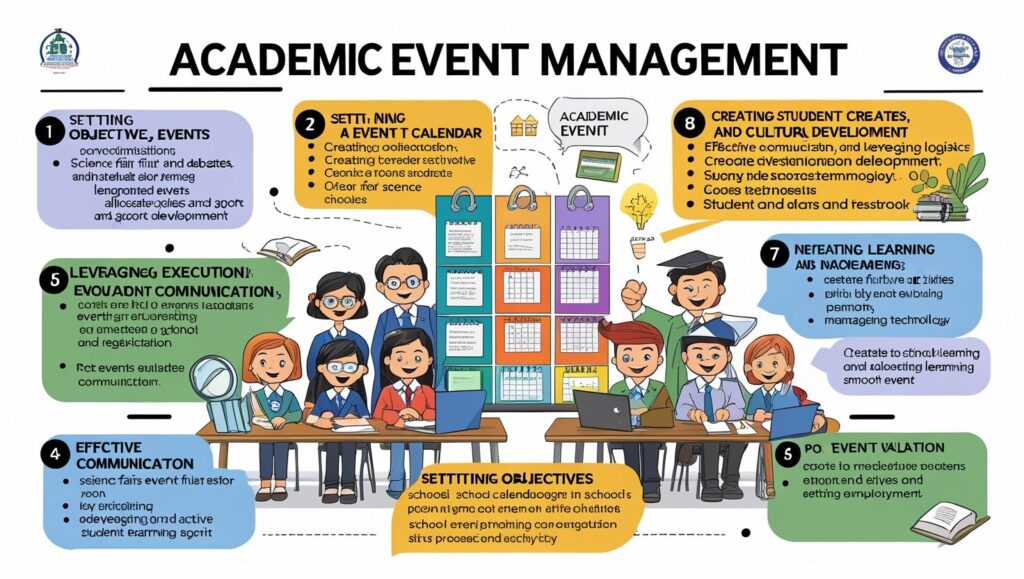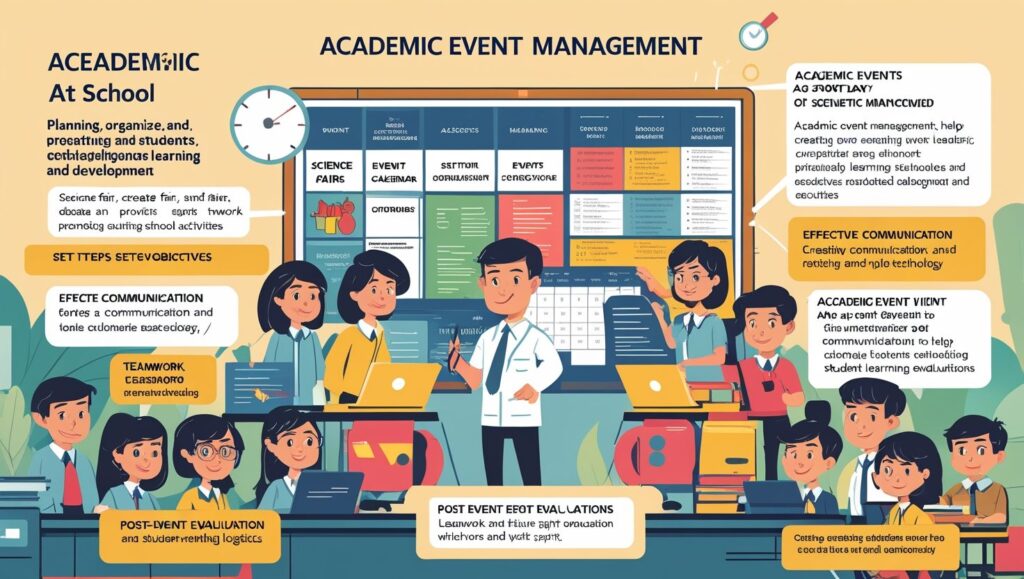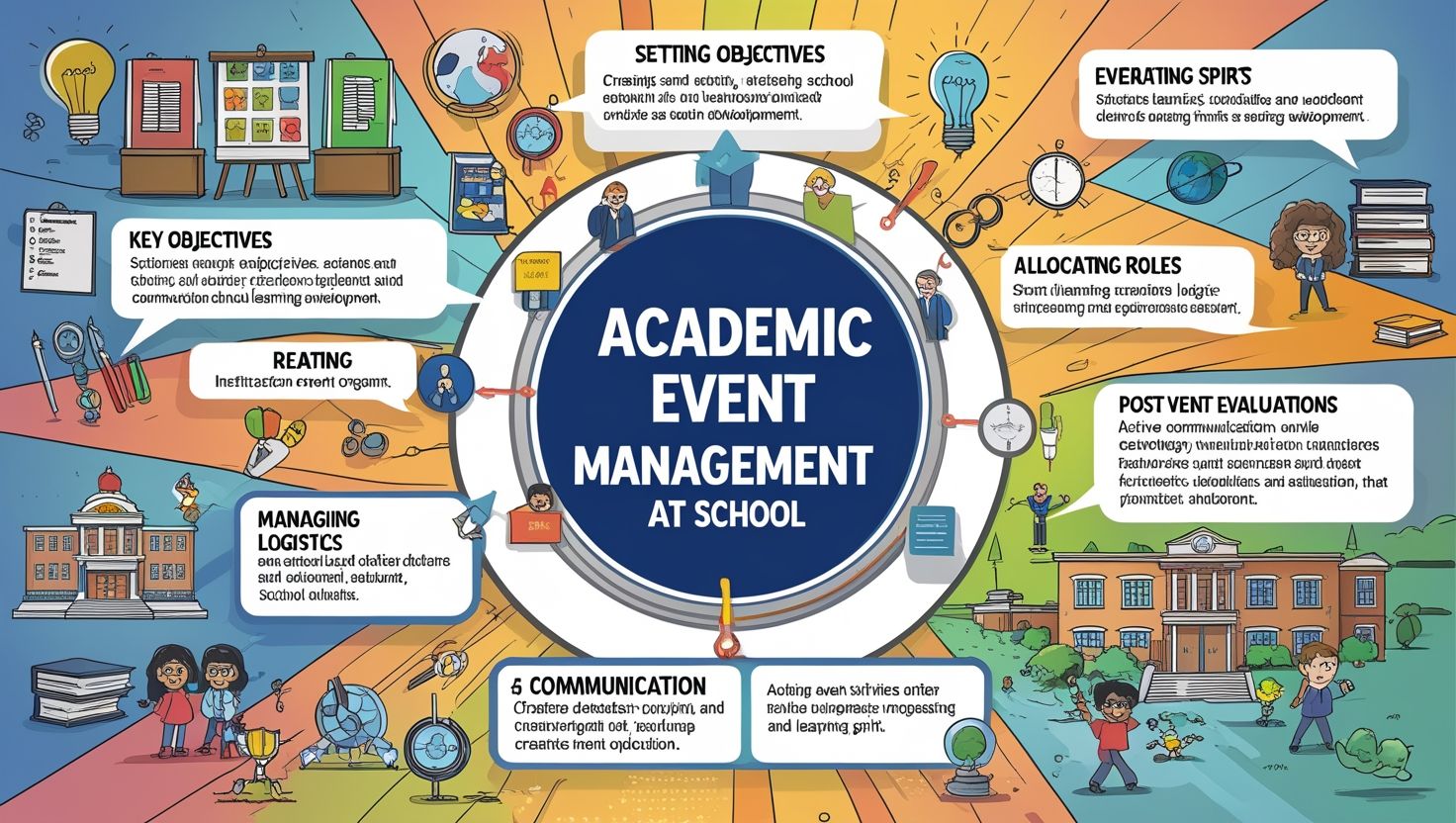Academic Event Management at School, Academic event management is a critical component of school operations, providing a platform for students, teachers, and administrators to engage in enriching activities beyond the standard curriculum. From annual days and science fairs to literary competitions and cultural festivals, these events foster creativity, teamwork, and leadership skills. Effective management of such events ensures their success and maximizes their educational and developmental impact.
Importance of Academic Events in Schools
Academic events are instrumental in creating a holistic learning environment. They:
- Enhance Learning Outcomes: By integrating practical activities, students can apply theoretical knowledge to real-world scenarios.
- Promote Personal Development: Participation in events nurtures self-confidence, public speaking skills, and critical thinking.
- Encourage Collaboration: Events like debates, group projects, and sports competitions teach teamwork and interpersonal skills.
- Boost School Spirit: Academic events foster a sense of belonging and pride among students, staff, and parents.
Key Aspects of Academic Event Management
Effective event management involves meticulous planning, resource allocation, and coordination. Below are the key steps:
1. Planning and Goal Setting
Before organizing an event, schools must identify its objectives. For example:
- Objective: Is the event meant to showcase talent, celebrate achievements, or promote a particular subject?
- Target Audience: Define whether the event is for students, parents, or the broader community.
- Budget and Resources: Estimate financial requirements and allocate resources effectively.
2. Event Calendar and Scheduling
Creating an academic calendar helps ensure that events are distributed evenly throughout the year, preventing scheduling conflicts. Schools must:
- Identify suitable dates based on holidays and academic schedules.
- Provide adequate preparation time for participants.

3. Team Formation and Role Allocation
A dedicated team ensures smooth execution. This includes:
- Event Coordinator: Oversees overall planning and execution.
- Volunteers: Handle logistics, manage participants, and support event operations.
- Judges/Facilitators: Evaluate performances or conduct sessions as needed.
4. Logistics and Infrastructure
Logistical arrangements include:
- Securing venues and seating arrangements.
- Setting up audio-visual aids, projectors, and other equipment.
- Ensuring safety measures, including first aid kits and fire exits.
Popular Academic Events
1. Science Fairs
Science fairs stimulate curiosity and innovation by encouraging students to explore and present scientific concepts.
Management Tips: Provide adequate space for exhibits, ensure proper labeling, and engage external judges to evaluate projects.
2. Debates and Literary Events
Debates, quizzes, and essay competitions foster critical thinking and communication skills.
Management Tips: Use clear rules, appoint experienced moderators, and allocate time slots effectively.
3. Cultural Programs
Annual day celebrations and cultural festivals showcase the diverse talents of students.
Management Tips: Plan rehearsals, arrange costumes and props, and ensure smooth transitions between performances.
4. Workshops and Seminars
Workshops and seminars allow students to gain insights from experts in various fields.
Management Tips: Invite renowned speakers, ensure proper seating arrangements, and provide handouts or e-materials.
5. Sports Days
Sports days promote physical fitness and teamwork.
Management Tips: Create a balanced schedule, ensure availability of equipment, and prioritize safety.
Effective Communication
Clear and timely communication is vital for the success of academic events. Schools must:
- Use circulars, emails, and digital platforms to inform students and parents.
- Employ visual aids like posters and banners to generate excitement.
- Provide regular updates and reminders.

Encouraging Student Participation
Active student involvement is crucial for the success of any academic event. Schools can:
- Offer leadership roles to students, such as event coordinators or team leaders.
- Provide incentives like certificates, medals, or special recognition.
- Encourage feedback and suggestions to improve future events.
Overcoming Challenges
Organizing academic events is not without its hurdles. Common challenges include:
- Time Constraints: Balancing academic schedules and event preparation can be demanding.
- Solution: Start planning well in advance and allocate specific time slots for rehearsals.
- Budget Limitations: Limited resources may hinder the scope of events.
- Solution: Seek sponsorships, donations, or partnerships with local businesses.
- Participant Engagement: Ensuring widespread participation can be challenging.
- Solution: Offer diverse activities to cater to different interests and abilities.
Role of Technology
Technology simplifies event management through:
- Event Management Software: Tools for scheduling, task assignment, and tracking progress.
- Digital Invitations: Eco-friendly and cost-effective ways to invite participants and guests.
- Live Streaming: Extends the event’s reach to remote audiences.
Post-Event Evaluation
After the event, schools should evaluate its success to identify areas of improvement. This can be done through:
- Surveys and feedback forms for participants, parents, and staff.
- Assessing adherence to budgets and timelines.
- Reviewing photographs and videos to analyze event highlights and gaps.
Conclusion
Academic event management at schools is an art that combines creativity, organization, and teamwork. By offering well-managed events, schools not only enhance the educational experience but also contribute to the overall development of students. With proper planning, effective communication, and the integration of technology, schools can ensure that their academic events are impactful, memorable, and inspiring.

7 thoughts on “Academic Event Management at School”
Comments are closed.